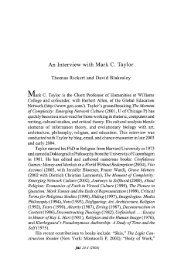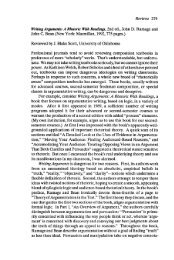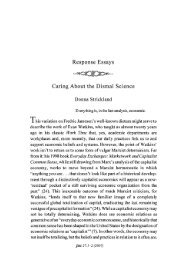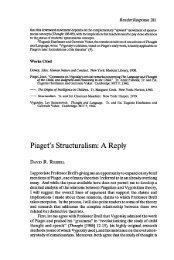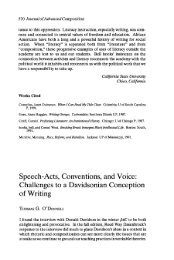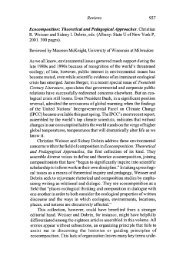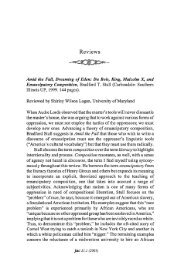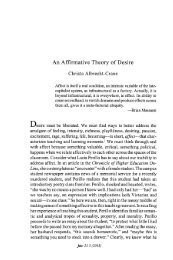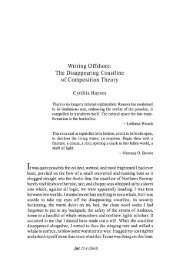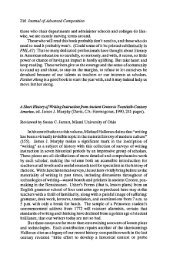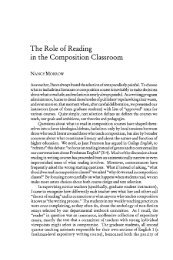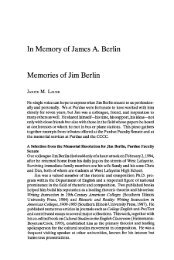Politics, Pedagogy, and the Profession of Composition ... - JAC Online
Politics, Pedagogy, and the Profession of Composition ... - JAC Online
Politics, Pedagogy, and the Profession of Composition ... - JAC Online
Create successful ePaper yourself
Turn your PDF publications into a flip-book with our unique Google optimized e-Paper software.
Bruce Horner 125<br />
"critical" pedagogy, I argue that a full <strong>and</strong> differentiated sense <strong>of</strong> power<br />
as relational requires that we recognize <strong>the</strong> different forms in which<br />
teachers exercise power <strong>and</strong> students achieve real, if limited, agency; it<br />
also requires that we locate <strong>the</strong> teacher, students, <strong>and</strong> course-in short, <strong>the</strong><br />
pedagogy-in relation to <strong>the</strong> larger institutional, material, <strong>and</strong> historical<br />
conditions <strong>of</strong> production. This examination must include analysis <strong>of</strong> <strong>the</strong><br />
means by which pedagogical work is "capitalized"-<strong>the</strong> means by which<br />
its value is defmed <strong>and</strong> exchanged in terms <strong>of</strong> <strong>the</strong> abstract skills <strong>and</strong><br />
knowledge that it ostensibly produces <strong>and</strong> <strong>the</strong>n "sells" in <strong>the</strong> marketplace<br />
<strong>of</strong> academic credentials, employment, <strong>and</strong> social status-<strong>and</strong> it must also<br />
include <strong>the</strong> contingencies affecting that capitalization <strong>and</strong> valuation. In<br />
<strong>the</strong> final section, I examine specific ways in which <strong>the</strong> politics <strong>of</strong><br />
pedagogy <strong>and</strong> <strong>the</strong> politics <strong>of</strong> <strong>the</strong> pr<strong>of</strong>ession may converge, <strong>and</strong> I delineate<br />
how addressing <strong>the</strong> processes <strong>of</strong> such convergences might enable us to<br />
engage more effectively <strong>the</strong> politics <strong>of</strong> our work <strong>and</strong> <strong>the</strong> work <strong>of</strong> our<br />
politics.<br />
<strong>Politics</strong> in <strong>Pedagogy</strong><br />
There exists a seemingly innocuous place for politics in pedagogy: as <strong>the</strong><br />
assigned subject matter on which students are to write (abortion, pro or<br />
con; gun control, pro or con; <strong>and</strong> so forth). The <strong>the</strong>ory behind this longst<strong>and</strong>ing<br />
practice would seem to be that students need lively topics on<br />
which to write, topics that will somehow inspire <strong>the</strong>m to do more than rote<br />
work. But <strong>the</strong>n, typically <strong>and</strong> significantly, <strong>the</strong> point <strong>of</strong> assigning such<br />
topics is not to learn more about <strong>the</strong>m, or even to learn what students'<br />
opinions are, but to produce fodder for lessons on <strong>the</strong> skills <strong>of</strong> writing<br />
formal arguments. And so long as students are judged not for what <strong>the</strong>y<br />
write (or think) but how <strong>the</strong>y write (with correct or incorrect spelling, sa y),<br />
no "political" controversy need ensue-hence <strong>the</strong> lack <strong>of</strong> public outcry<br />
over <strong>the</strong> practice. The innocuousness <strong>of</strong> such a practice derives from <strong>the</strong><br />
commodification <strong>of</strong> both politics <strong>and</strong> <strong>the</strong> teaching <strong>of</strong> writing. In such<br />
pedagogies, both <strong>the</strong> positions taken <strong>and</strong> <strong>the</strong> work <strong>of</strong> producing <strong>the</strong>m are<br />
commodified, removed from <strong>the</strong> circumstances in which <strong>the</strong> actual taking<br />
<strong>of</strong> those positions <strong>and</strong> <strong>the</strong> work <strong>of</strong> adopting <strong>and</strong> advocating <strong>the</strong>m have<br />
immediate use value. Instead, such pedagogies use assignments as a<br />
means <strong>of</strong> producing <strong>the</strong> abstracted skills <strong>of</strong> argumentation (<strong>and</strong>, sometimes,<br />
research). The choice <strong>of</strong> assigned "positions" remains a matter <strong>of</strong><br />
indifference.<br />
The crucial role that abstraction <strong>and</strong> <strong>the</strong> commodification <strong>of</strong> political<br />
topics <strong>and</strong> argumentation plays in <strong>the</strong> acceptability <strong>of</strong> such a composition



